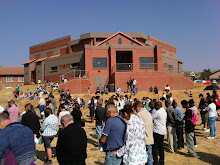Forwards or Backwards
by Rev Dr John Bailie
A few simple thoughts on South Africa 12th April 2010:
Nations, at some or other stage all throughout their history, have faced the choice to either move forward or backward. In fact, this choice is symptomatic of the development of humankind.
No society stays exactly the same. Partly, because they collectively face new challenges. Partly, because they come into contact with other societies and are influenced by them. And partly, because human beings are constantly evaluating themselves and making adjustments.
What determines the choice is not, as we are sometimes lead to believe, historical settings, individuals or the influence of leadership. The choice is affected when ordinary people are moved by their own understanding of the need for change.
Nelson Mandela and FW de Klerk did not liberate South Africa. And while they received the Nobel Peace Prize because of their leadership positions at the time, they merely represented our South African collective need for change. It was the everyday interaction of millions ordinary South Africans which lead to the change. Without this choice, we may still have found ourselves gripped by a destructive political and social system.
Within this collective choice, there is always going to be those who either sit on the left or the right. In all of history, in all of societal changes, neither of these have the ability to effect change. Yet ironically, they often have the loudest voice. And while they seem to have nothing to lose, the truth is that they really desire to gain power at any cost. This cost is to destroy the collective choice. They do however, enable the collective whole to examine and re-examine their position. And this examination is vital to the health of the collective whole.
A question, at this juncture, in terms of the South African collective whole, may be whether the recent events represent the left, right or the collective whole? If in fact they do represent the collective whole, then one would want to assert that the country has chosen to step backward. It is the path to more violence, destabilisation and ultimately collapse.
For ordinary people like myself as part of the collective whole, (I am not a member of a political party nor have I been to prison nor do I aspire to be anything other than an everyday person), I refuse to believe that these events represent me. I refuse to be swept up by the left or right.
Rather, I recognise that I am fulfilling my commitment to making the collective change of 1994 a reality. As a training Christian minister, I spent a year in a township, washed the feet of my fellow South Africans at Easter and continue to believe in the future for South Africa.
Despite this, the current events have shaken my, and I believe many others, belief in South Africa. I believe that we all have much work to do. This work must not be determined by political parties, the left or right but our collective examination of who we are. If we allow individuals the space to hijack our collective choice we will only have ourselves to blame when South Africa does not live up to her potential.
The new South Africa is almost twenty years old and I feel no guilt about the past, it only takes me backward. Rather, I believe, that we as a collective whole can, right now, choose to move forward and choose leaders who represent us.
I am not a decision maker so the best I can offer is to challenge my common sense and all my ordinary fellow South Africans, to continue to work at our collective whole. Fancy programmes, extreme leaders and quick fixes will do nothing for us. Rather, I chose to live as part of a collective whole facing the everyday challenges of daily living together. My faith determines that I should and it is really the only way for us to attain long-term potential as a nation. After all, any collective whole that can topple a destructive political system without violence must unquestionably be able to resist being hijacked by extremism.

+of+DSC_0018.jpg)

